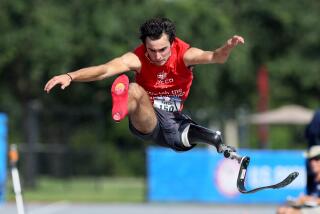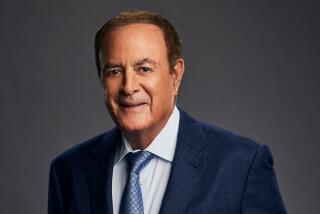He’s Great, but Where’s the Gold?
- Share via
If anyone needed further proof of the perverse sense of humor of the gods of athletics or the fates controlling the games we play, consider the fact that Renaldo Nehemiah owns a Super Bowl ring but no Olympic gold medal.
That is as big a joke on the world as if Spencer Tracy never won an Oscar but got Lifeguard of the Year. Or as if Caruso went down in history for playing the piano.
For Renaldo Nehemiah not to get a gold medal is as big a historic injustice as--well, suppose Bill Tilden never got to play Wimbledon, what if Dempsey never got a title shot?
Renaldo Nehemiah didn’t fail to get a gold medal, he never got a chance.
Renaldo Nehemiah is the greatest high hurdler in the world, maybe in history.
He holds the world record (12.93 seconds), he broke it twice, he’s the only man in the world to run the race under 13 seconds and he did it something like six times if you count unofficial or wind-aided efforts.
Yet, 30 years down the line, when Skeets Nehemiah tries to tell his grandchildren how great a track and field star he was, they may look at him strangely and say: “Yeah, Grandpa. But where are the gold medals?”
It is a question that annoys Skeets Nehemiah even today. “Which would you rather have, a world record or a gold medal?” he challenges.
It is clear where his answer lies: He has the world record--what he doesn’t have is the gold medal.
It is a question, though, on which history may ultimately have the last word.
You can guess what its verdict will be. World records come and go. A gold medal is forever. Mute but immutable proof that for one four-year period you were the best in the world at what you did.
Or, the best that got to the starting line.
Skeets Nehemiah set his world record in the 110-meter high (42-inch) hurdles in 1979, and the field he would have had to face in the Moscow Olympics the next year wouldn’t have known which way he went.
The Moscow race was the slowest since 1964 and the first Olympics in history where no American won a medal (because no American was in it).
Jimmy Carter took Renaldo out of the 1980 Olympics, but it took a combination of forces to keep him out of the 1984 Games.
It was an unlikely coalition of the National Football League, the International Amateur Athletic Federation, Bill Walsh and Skeets Nehemiah that did it.
The White House this time was neutral.
Whatever forces were at work, it added up to a mistake.
Nehemiah opting for football was like Rembrandt opting to paint kitchens. Michelangelo hanging paper.
Football teams drooled when they saw Nehemiah coming down a track. He didn’t run, he poured.
All that power and strength and speed. They could just imagine what he would do with a football in the open field.
The problem proved to be getting the ball to him.
Eight pro teams were after him initially.
But, the 49ers’ Bill Walsh saw himself as football’s Pygmalion. He couldn’t wait to get his tools on all this raw talent, this hunk of track marble, and turn it into a work of art on the football field, maybe the greatest offensive machine the game had seen.
George Bernard Shaw’s Professor Higgins never took the time and patience with Liza Doolittle that Walsh took with his fair football player.
Walsh didn’t rush him. He was reluctant to throw him in stressful situations.
“He was so fearful of my not making the grade that he prevented my natural ability from progressing,” Nehemiah recalls. He was like a doting parent who’s afraid to let his kid go out into the real world.
Whenever he did, NFL cornerbacks proved a lot harder for this teacher’s pet to get over than high hurdles.
For one thing, hurdles didn’t try to separate your legs from the rest of you at the start line, then pull your belt or your facemask or your arm as you went by--and they certainly didn’t slam you to the ground and then whisper in your ear as you would lie there: “This ain’t the Pepsi Relays, Swifty. Why don’t you go back to something you can play in your underwear?”
Nehemiah thought pro football would bring him fame and fortune. It may have brought him obscurity and the low rent district. Nehemiah made out pretty well financially at his non-career with the 49ers ($200,000 a year for three years), but the facts are, track and field was just coming into its own as a big money sport about the time he signed with the 49ers.
Corporate sponsorship and commercial interest in the ’84 Olympics and liberalized financial rules were making contemporaries like Carl Lewis and Edwin Moses millionaires-- without the nosebleeds, the torn disks, damaged Achilles’ tendons and bone breaks of the gridiron.
Nehemiah began to lobby for a return to track even while he was still playing for the 49ers, but, while the American officials were receptive, the international federations were not.
One of the misperceptions of the internationalists was that participation in American football was somehow an aid to performance on the track.
Clearly, they had never heard of Dick Butkus--or Lawrence Taylor. Some years ago, the movie actor Victor Mature, desirous of joining the snobbish Los Angeles Country Club, applied for initiation.
He was coldly informed that the LACC had a policy of not admitting actors. Mature protested that he was not an actor, had never been one, and, as proof, he offered to screen a festival of his pictures for the board of governors.
Skeets Nehemiah did something similar.
He produced a panel of NFL game films for the delectation of the IAAF.
“They showed me getting clobbered and reclobbered and the violence of the game and injuries in it.” The IAAF got the message.
The only thing better for a hurdler would be periodically falling off a three-story building into traffic or crashing into a concrete abutment several times every Sunday.
Getting chased by a lion might make you fast but, in the NFL, Nehemiah pointed out, the lion caught you.
The Olympics are being liberalized to a point where, presumably, a Magic Johnson or a Wayne Gretzky could play in the next one if they so desired. But, is it too late for Renaldo Nehemiah?
Now 27, Skeets is hitting he comeback trail. He will run the hurdles in the 1987 Sunkist Invitational Meet at the Sports Arena on Jan. 16.
He has run one race since hanging up his helmet and face guard. At Zurich, last summer, he beat the NCAA hurdles champion, Keith Talley, with a respectable 13.48 clocking.
He is eager to meet the L.A. Olympic high hurdles winner, Roger Kingdom.
It is Nehemiah’s belief that Kingdom is wearing his gold medal (along with the East German, Thomas Munkelt, who won at Moscow).
“Things just came together for Kingdom in one afternoon. He’s not that consistent and he’s not that experienced,” Nehemiah insists.
But he’s got a gold medal, and the world’s greatest hurdler doesn’t.
Still, there’s always 1988. Skeets can hope he can get his form back for that.
His chances would be better if Bill Walsh would take a shine to Roger Kingdom. Or if the IAAF, in the interests of fair play, decided every hurdler finalist had to spend three years with the 49ers first.
More to Read
Go beyond the scoreboard
Get the latest on L.A.'s teams in the daily Sports Report newsletter.
You may occasionally receive promotional content from the Los Angeles Times.






